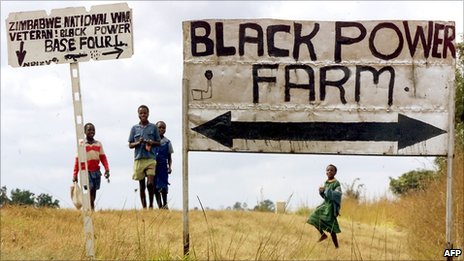 By Lovemore Ranga Mataire
By Lovemore Ranga Mataire
The HeraldBRITAIN'S Institute of Development Studies at Sussex University has said Zimbabwe's land reform programme is not an economic failure as widely portrayed by most Western media.
In a study recently released by the institute, the lead author of the research, Mr Ian Scoones, told BBC News that he was surprised with a lot of activities happening on farms visited over a 10-year period.
Institute_of_Development_Studies_-_Zimbabwe_s_land_reform_te<wbr>.mp4"What we have observed on the ground does not represent the political and media stereotypes of abject failure; but nor indeed are we observing universal success. People were getting on with things and doing remarkably well in difficult circumstances," says the study, titled Zimbabwe's Land Reform, Myths and Realities.
The report is likely to infuriate Western establishments, which have over the years denigrated the land reform programme as a vote-buying gimmick that led to the destruction of one of Africa's vibrant economies.
Although the study notes the existence of problems with the fast track land reform, particularly inadequate funding, it however highlights undue politicisation by the country's detractors.
The 10-year study of 400 households in Masvingo Province put to rest five myths associated with the land reform programme.
One of the myths is that the exercise was a total failure and that most of the land was given to political cronies.
The other myths that the report debunks include lack of investment on the land and that agriculture is in complete ruins – creating food insecurity and that the rural economy has all but collapsed.
The study found that two-thirds of people allocated land in Masvingo were ordinary low-income Zimbabweans and the remaining one-third includes civil servants, former farm workers, business people and members of the security services.
The research found that, on average, each household had invested more than "US$2 000 on their land since settling on it – clearing land, building houses and digging wells".
The investment has led to knock-on-activity in the surrounding areas, boosting the rural economy and proving further employment.
This assertion is in sharp contrast with the perception of most Western countries' particularly Britain and United States.
In a recent classified diplomatic report released by Wikileaks website, former United States ambassador Christopher Dell castigated President Mugabe for embarking on the land reform programme saying the exercise had "destroyed Zimbabwe's agriculture sector, once the bedrock of the economy".
However, one of those interviewed by the researchers, identified only as JM, said the land had transformed their lives as they used to rely on help from others but now owns five head of cattle and employs two workers.
Others said they are much better off farming than when they had jobs.
About half of those interviewed were doing well, reaping good harvests and re-investing the profits.
Maize is Zimbabwe's main food crop but its production remains reliant on good rains.
The report says Zimbabwe's food crisis of 2007/08 cannot be put down to the land seizures, as those people who went hungry produced a large surplus both the previous and subsequent years.
The research established that most of those struggling are the least well-off civil servants, such as teachers and nurses, who have been unable to get credit and do not have the resources, or political connections, to invest in their land.
As Zimbabwe' economy slowly recovers under a power-sharing government, a new programme can be worked out which would give these people the backing they need to succeed, the report says.
It is often argued that large-scale commercial farming – as many of the white Zimbabweans used to practise – is inherently more efficient than the smallholder system which replaced it, but Mr Scoones dismisses this argument and says he is backed by several studies from around the world.
The study says it is now impossible to return to the previous set-up and suggests that some of the evicted white farmers may one day work with the new farmers as consultants, marketing men, farm managers or elsewhere in the overall agricultural economy, such as transporting goods to the market or helping to transform and add value to their produce.
***
Zimbabwe's land reform ten years on: new study dispels the mythsInstitute of Development Studies, at the University of Sussex, Brighton
By Ian Scoones - November 16, 2010Zimbabwe land reform 'not a failure' by Joseph Winter - November 18, 2010 - BBC News 